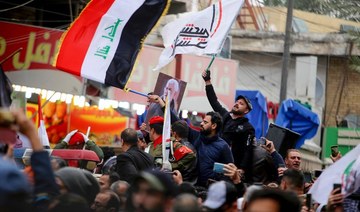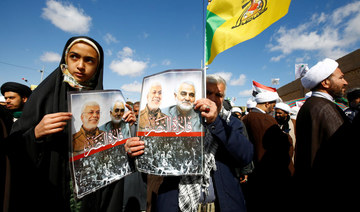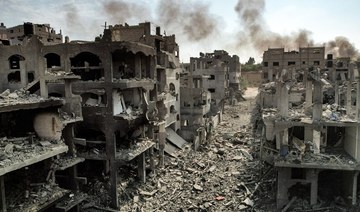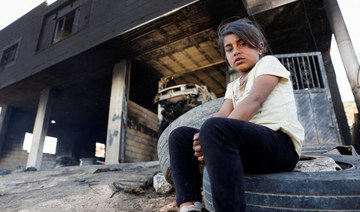NAJAF, Iraq: A minibus stopped outside the world’s largest cemetery in the Iraqi Shiite holy city of Najaf. Five women got out, telephone cameras filming the scene, and dashed excitedly toward a grave.
Clad in black, they joined wailing women and men beating their chests in grief at Wadi Al-Salam (valley of peace), an ever-expanding cemetery.
All eyes were on the grave of Iraqi paramilitary commander Abu Mahdi Al-Muhandis.
Killed alongside top Iranian general Qassem Soleimani in a US drone strike in Baghdad on January 3, Muhandis is now revered as a martyred icon of anti-American resistance.
His grave has become a magnet for Shiites vowing vengeance against Washington.
Below a life-sized portrait of the deceased commander, a young man kneeled before his grave, the wailing of women ringing around him.
“May God avenge us from America,” the man screamed.
Located along aisle nine of Wadi Al-Salam, the commander’s final resting place has gained near-holy status.
It has become a stop for the thousands of Shiite pilgrims who pass through Najaf each day to visit the tomb of Imam Ali, son-in-law of the Prophet Muhammad.
“It is not just a grave, it has been transformed into a shrine,” Abbas Abdul Hussein, a security official at the cemetery, said.
“Men, women and children... flock from Iran, Lebanon and Bahrain daily to visit Abu Mahdi,” he said.
Washington’s number one enemy in Iraq, Muhandis was head of the Hashed Al-Shaabi, an Iraqi military network largely incorporated into the state.
He was Soleimani’s top Iraqi aide and widely seen as Tehran’s man in Baghdad.
The US strike that killed Muhandis and Soleimani outside Baghdad airport dealt a severe blow to Tehran and its so-called axis of resistance that stretches across Iran, Iraq, Yemen and Lebanon.
Iraq’s armed factions, the most hard-line of which are financed, trained and armed by Iran, have vowed to avenge Muhandis’s death.
They said America’s 5,200 troops in Iraq would have “hell” to pay.
But almost two months after the assassination, there has yet to be a heavy response, apart from Iranian missile strikes on January 8.
As well as the grave at Wadi Salam, a small altar has been erected at the site of Muhandis’s death at the entrance to Baghdad airport.
Dressed in black from head-to-toe, Um Hussein said she made a 450-kilometer trek from Basra in southern Iraq to pay homage at the grave.
“Every time we come to visit (the tomb of) Imam Ali, we will make a stop to see the hero and martyr Muhandis,” she said.
“It is a duty.”
From the early hours of the day until after sunset, the entrance to the cemetery is bustling with minibuses ferrying visitors.
Standing over Muhandis’s grave, tears rolling down her cheeks, Souad said she also came from Basra to honor the “hero” who “defeated” the Daesh group.
“His death really affected us and the Hashed as a whole,” she said.
Wadi Salam is also the final resting place of thousands of Hashed fighters killed during the 2014-2017 battle against Daesh.
It was on this front that Muhandis — known for his virulent anti-Americanism long before the 2003 US-led invasion of Iraq — became a revered figure.
Muhandis, accused of involvement in deadly 1983 attacks against the French and US embassies in Kuwait, oversaw the Hashed and its integration into the state.
He transformed most of his paramilitary fighters into regulars, but some have remained outside state structures, including those Washington accuses of attacking its personnel in Iraq.
Flanked by the graves of other Shiite commanders, Reza Abadi, an Iranian from Soleimani’s hometown of Kerman, recited a eulogy over the grave of Muhandis.
“We came here to show our respect for this man who is dear to Iranians and Iraqis,” he said. “The memory of the two martyrs, Hajj Qassem and Abu Mahdi, will never be forgotten.”
Grave of slain Iraq commander, a new anti-US magnet
https://arab.news/8j375
Grave of slain Iraq commander, a new anti-US magnet
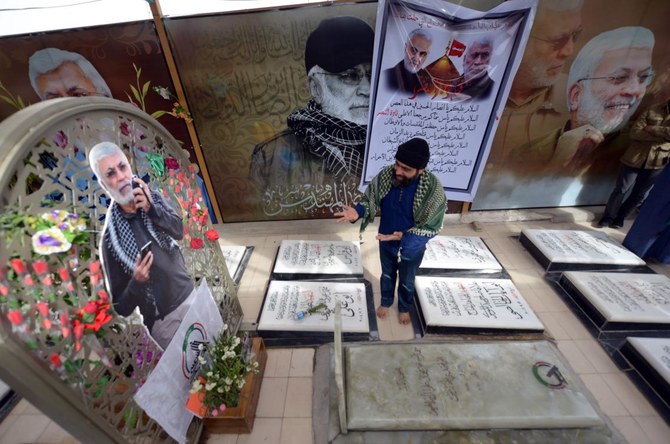
- Paramilitary commander Abu Mahdi Al-Muhandis is now revered as a martyred icon of anti-American resistance
- Muhandis was known for his virulent anti-Americanism long before the 2003 US-led invasion of Iraq
Iraq hangs 11 convicted of ‘terrorism’: security, health sources
NASIRIYAH, Iraq: Iraqi authorities have executed this week at least 11 people convicted of “terrorism,” security and health sources said Wednesday, with rights group Amnesty International condemning an “alarming lack of transparency.”
A security source told AFP that 11 “terrorists from Daesh group” were executed by hanging at a prison in Nasiriyah, while a local medical source confirmed that the health department had received the bodies of 11 executed people.
Iraqi authorities have executed this week at least 11 people convicted of “terrorism,” security and health sources said Wednesday. (Reuters)
Biden says Israel must allow aid to Palestinians ‘without delay’
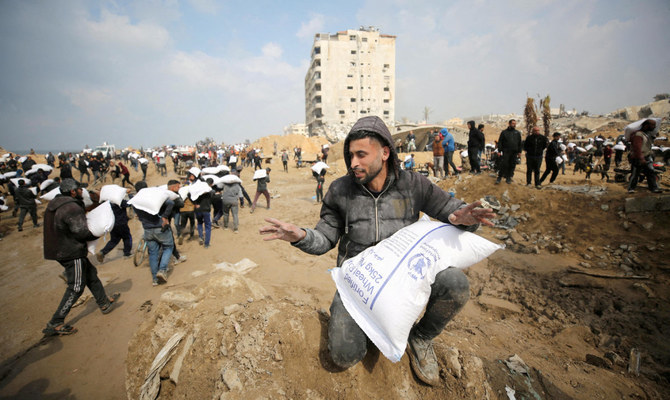
- “We’re going to immediately secure that aid and surge it,” Biden said
- “Israel must make sure all this aid reaches the Palestinians in Gaza without delay“
WASHINGTON: President Joe Biden on Wednesday demanded that new humanitarian aid be allowed to immediately reach Palestinians in the Gaza Strip as key US ally Israel fights Hamas there.
“We’re going to immediately secure that aid and surge it... including food, medical supplies, clean water,” Biden said after signing a massive military aid bill for Israel and Ukraine, which also included $1 billion in humanitarian aid for Gaza.
“Israel must make sure all this aid reaches the Palestinians in Gaza without delay,” he said.
US-Israel relations have been strained by Israel’s conduct of the war in Gaza and Israeli Prime Minister Benjamin Netanyahu’s plan to send troops into the southern Gazan city of Rafah, where 1.5 million people are sheltering, many in makeshift encampments.
“This bill significantly — significantly — increases humanitarian assistance we’re sending to the innocent people of Gaza who are suffering badly,” Biden said.
“They’re suffering the consequences of this war that Hamas started, and we’ve been working intently for months to get as much aid to Gaza as possible.”
Israel hits Lebanese border towns with 14 missiles
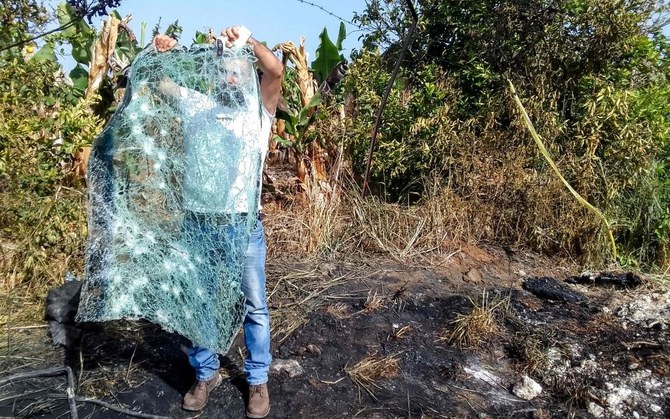
- Hezbollah targets Israeli settlements in retaliation for Hanin civilian deaths
- Hezbollah said it attacked the Shomera settlement with dozens of Katyusha rockets
BEIRUT: Clashes between Hezbollah and Israeli forces escalated sharply on Wednesday, the 200th day of conflict in southern Lebanon’s border area.
Israeli airstrikes created a ring of fire around Lebanese border towns, with at least 14 missiles hitting the area.
In the past two days, military activity in the border region has increased, with Hezbollah targeting areas in northern Acre for the first time in the conflict.
On Wednesday, Israeli strikes hit the outskirts of Aita Al-Shaab, Ramya, Jabal Balat, and Khallet Warda.
The Israeli military said it had destroyed a missile launching pad in Tair Harfa, and targeted Hezbollah infrastructure in Marqaba and Aita Al-Shaab.
Israeli artillery also struck areas of Kafar Shuba and Shehin “to eliminate a potential threat.”
Hezbollah also stepped up its operations, saying this was in retaliation for the “horrific massacre committed by the Israeli enemy in the town of Hanin, causing casualties and injuries among innocent civilians.”
A woman in her 50s and a 12-year-old girl, both members of the same family, were killed in the Israeli airstrike. Six other people were injured.
Hezbollah said it attacked the Shomera settlement with dozens of Katyusha rockets.
The group said it also targeted Israeli troops in Horsh Natawa, and struck the Al-Raheb site with artillery.
It also claimed to have killed and wounded Israeli soldiers in an attack on the Avivim settlement.
Israeli news outlets said that a rocket-propelled grenade hit a house in the settlement, setting the dwelling ablaze.
Hezbollah’s military media said that in the past 200 days of fighting with Israel, 1,998 operations had been carried out from Lebanon, Yemen and Iraq, including 1,637 staged by Hezbollah.
Egypt denies any discussions with Israel over Rafah offensive
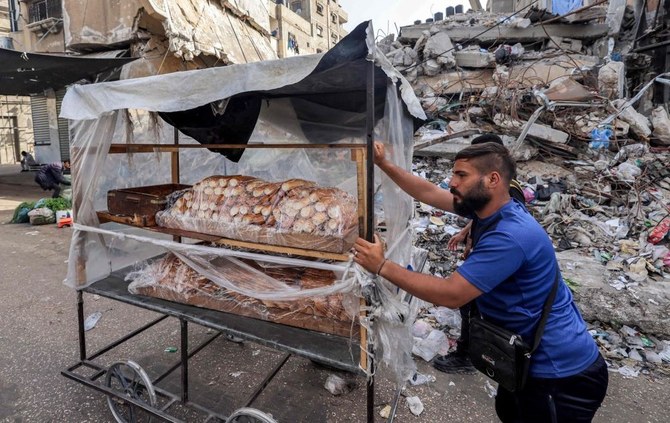
- Egypt reiterates opposition to any move on Rafah
- Warnings tell of expected losses and negative repercussions
CAIRO: Egypt has denied any discussions with Israel regarding an offensive in the Palestinian city of Rafah in the southern Gaza Strip.
Diaa Rashwan, the head of Egypt’s State Information Service, has refuted what has been claimed in one of the major American newspapers: that Egypt has discussed with the Israeli side its plans for an offensive in Rafah.
Rashwan has affirmed the Egyptian stance — announced several times by its political leadership — of complete opposition to the operation, which it is thought will lead to further massacres, massive human losses, and widespread destruction.
He added that Egypt’s repeated warnings have reached the Israeli side, from all channels, since Israel proposed carrying out a military operation in Rafah. These warnings tell of expected losses and the negative repercussions on the stability of the entire region.
Rashwan added that while Israel is contemplating its operation — which Egypt and most of the world and its international institutions stand against — Egyptian efforts since the beginning of the Israeli aggression had focused on reaching a ceasefire agreement and the exchange of prisoners and detainees.
He said Egypt was seeking the entry of humanitarian aid into the Gaza Strip, especially the north and Gaza City, and the evacuation of wounded and sick people for treatment outside the area.
Egypt has repeatedly opposed the displacement of Palestinians from Gaza and is warning against any military operation in Rafah.
UAE announces $544m for repairs after record rains
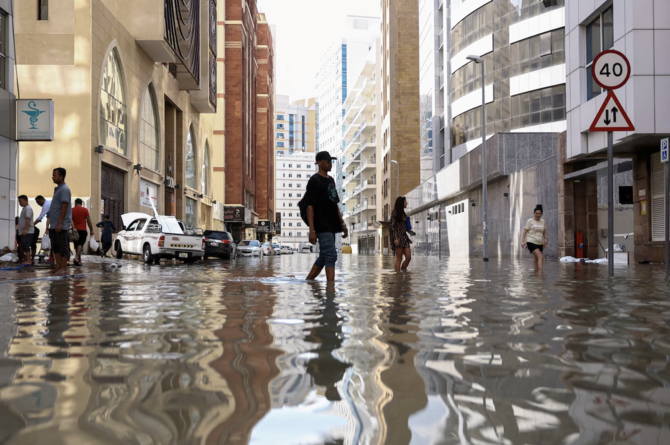
- Wednesday's announcement comes more than a week after the unprecedented deluge lashed the desert country
- “The situation was unprecedented in its severity but we are a country that learns from every experience,” Sheikh Mohammed said
DUBAI: The United Arab Emirates announced $544 million to repair the homes of Emirati families on Wednesday after last week’s record rains caused widespread flooding and brought the Gulf state to a standstill.
“We learned great lessons in dealing with severe rains,” said Prime Minister Sheikh Mohammed bin Rashid Al-Maktoum after a cabinet meeting, adding that ministers approved “two billion dirhams to deal with damage to the homes of citizens.”
Wednesday’s announcement comes more than a week after the unprecedented deluge lashed the desert country, where it turned streets into rivers and hobbled Dubai airport, the world’s busiest for international passengers.
“A ministerial committee was assigned to follow up on this file... and disburse compensation in cooperation with the rest of the federal and local authorities,” said Sheikh Mohammed, who is also the ruler of Dubai, which was one of the worst hit of the UAE’s seven sheikhdoms.
The rainfall was the UAE’s heaviest since records began 75 years ago.
Cabinet ministers also formed a second committee to log infrastructure damage and propose solutions, Sheikh Mohammed said in a post on X, formerly Twitter.
“The situation was unprecedented in its severity but we are a country that learns from every experience,” he said.
The storm, which dumped up to two years’ worth of rain on the UAE, had subsided by last Wednesday.
But Dubai faced severe disruption for days later, with water-clogged roads and flooded homes.
Dubai airport canceled 2,155 flights, diverted 115 and did not return to full capacity until Tuesday.



